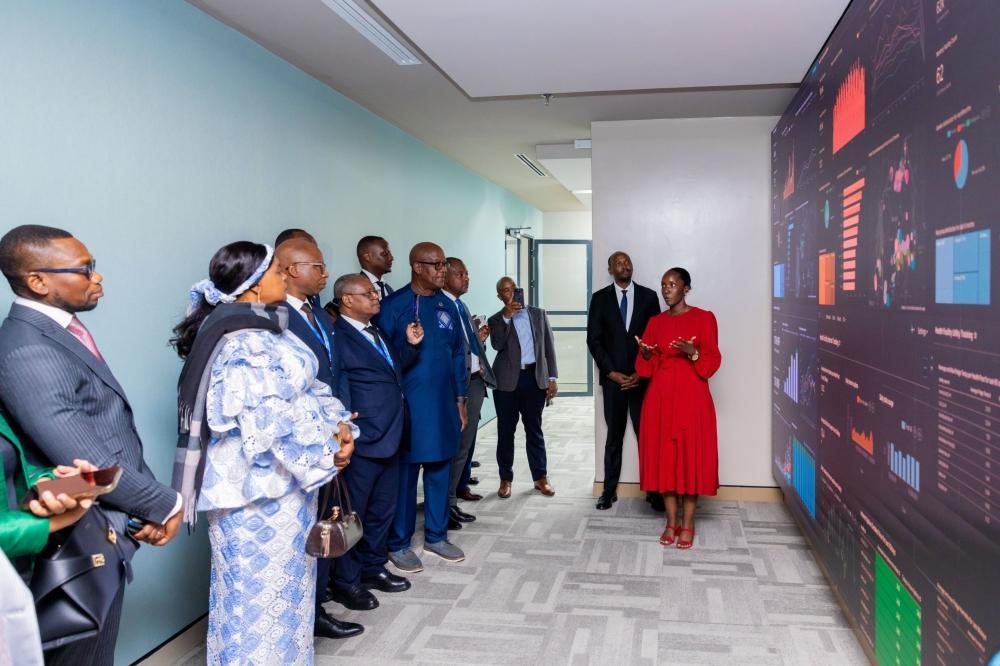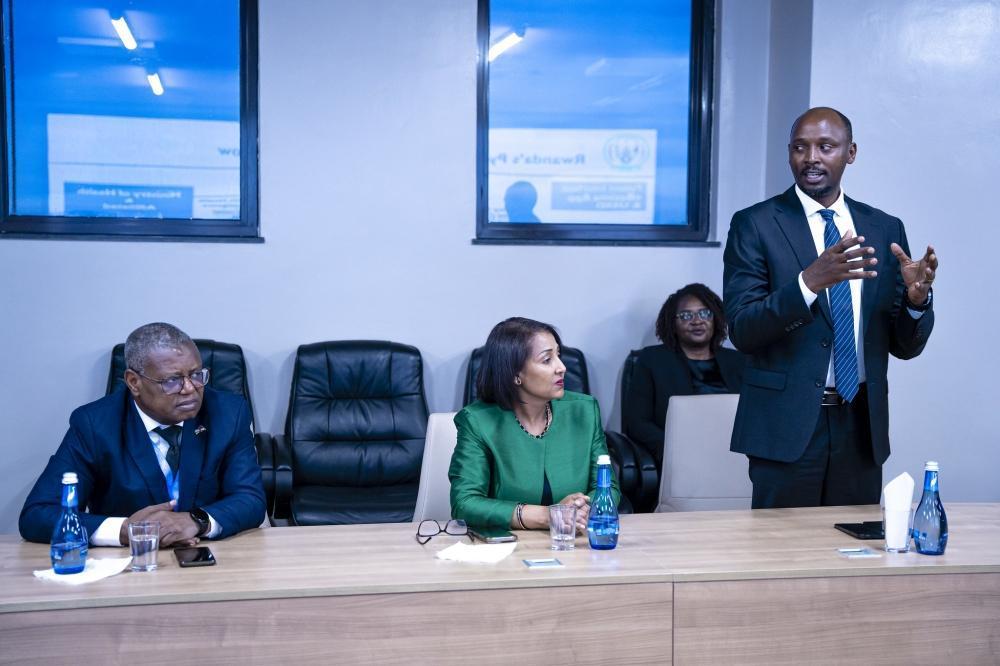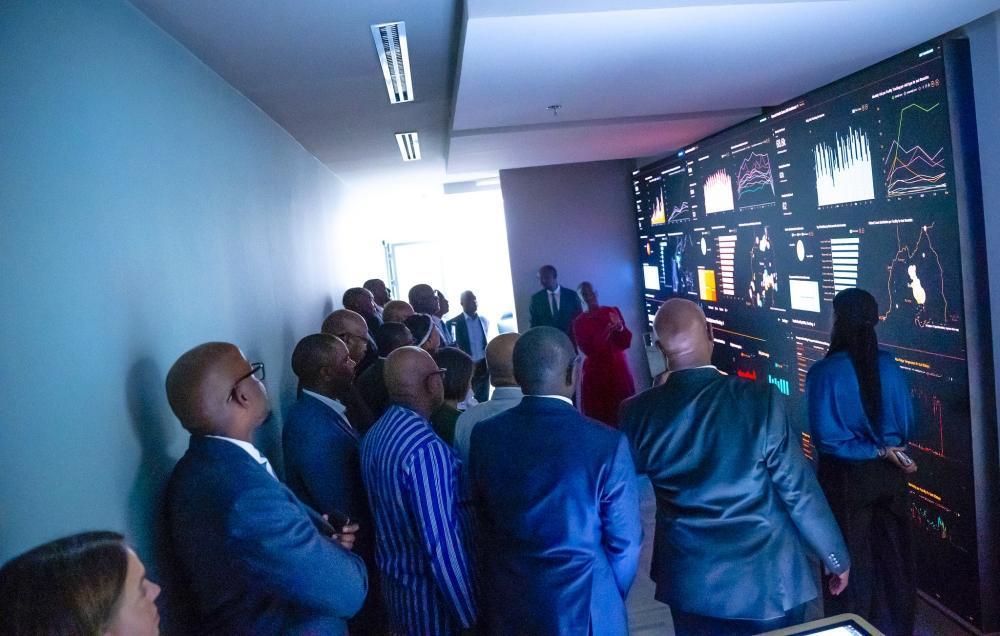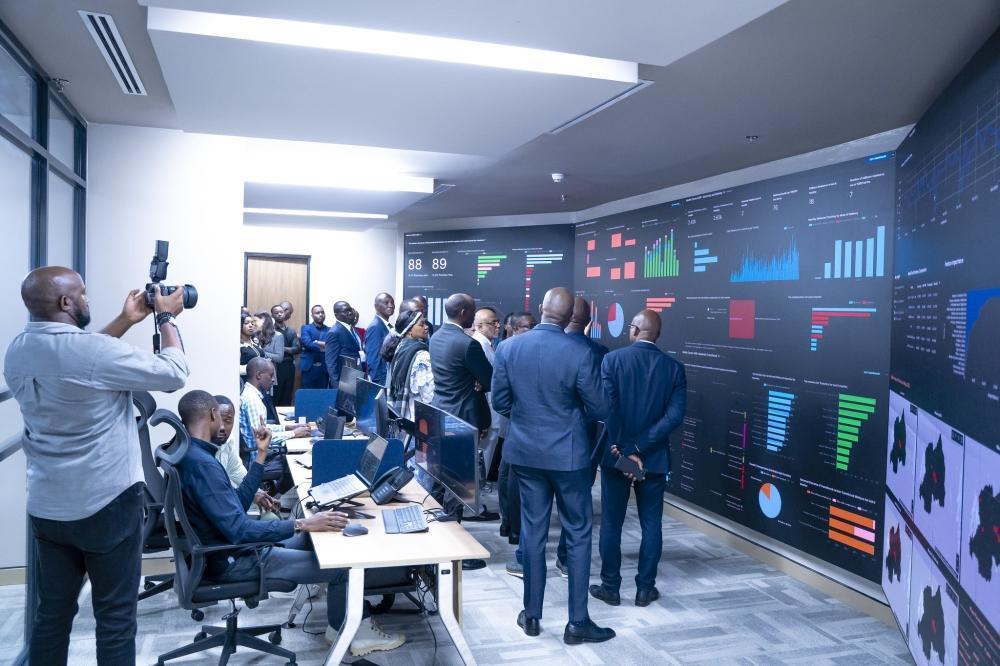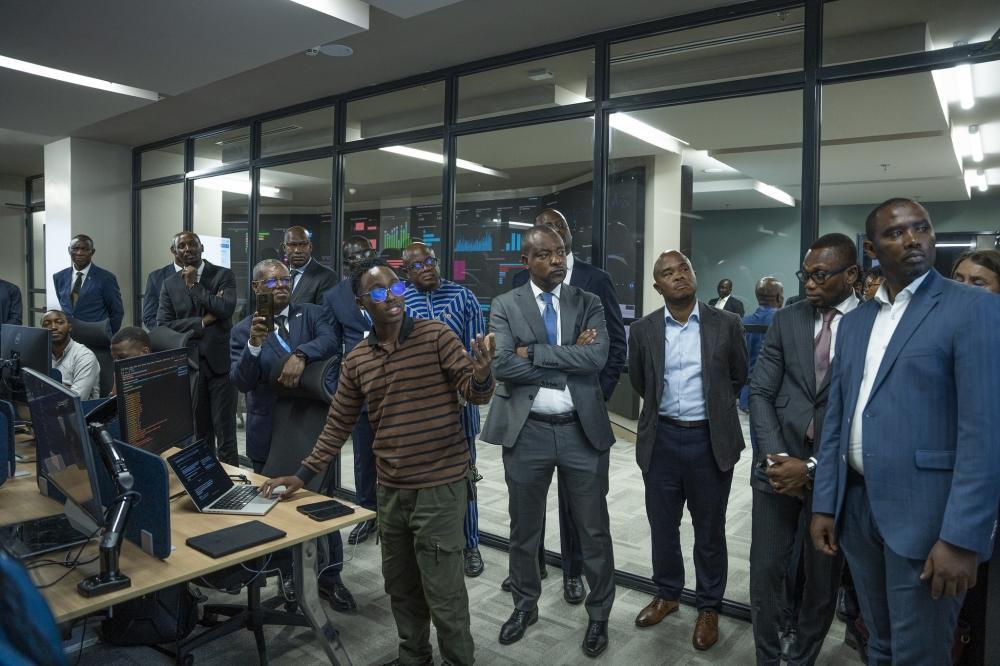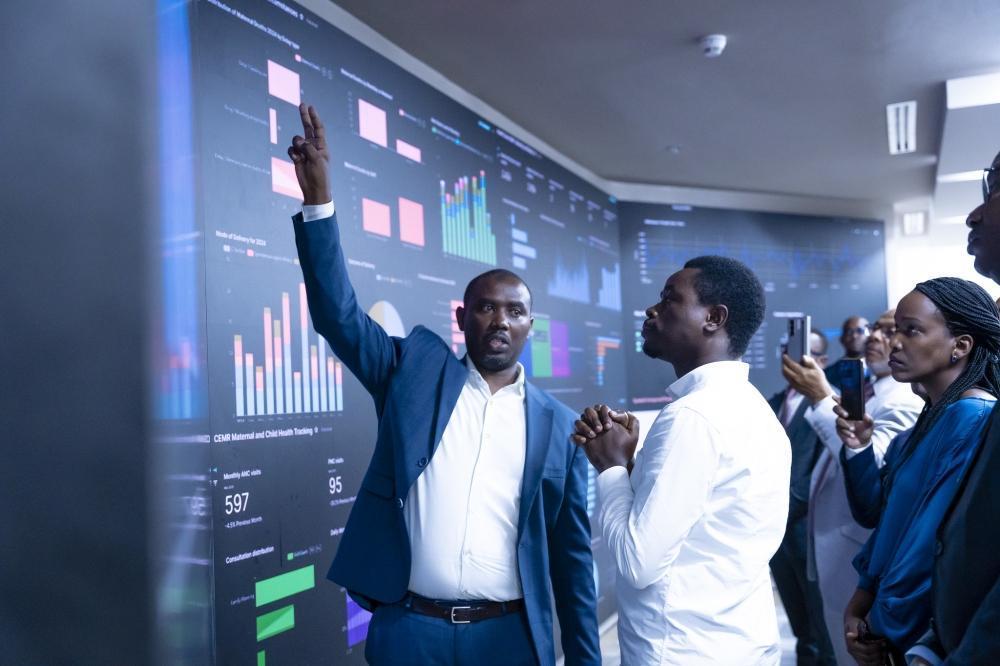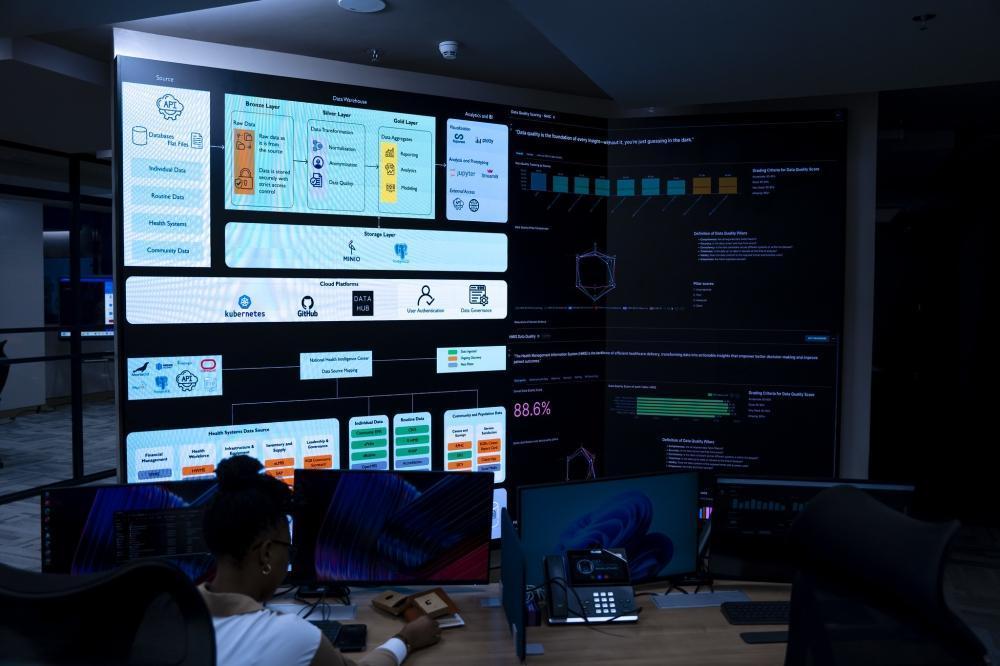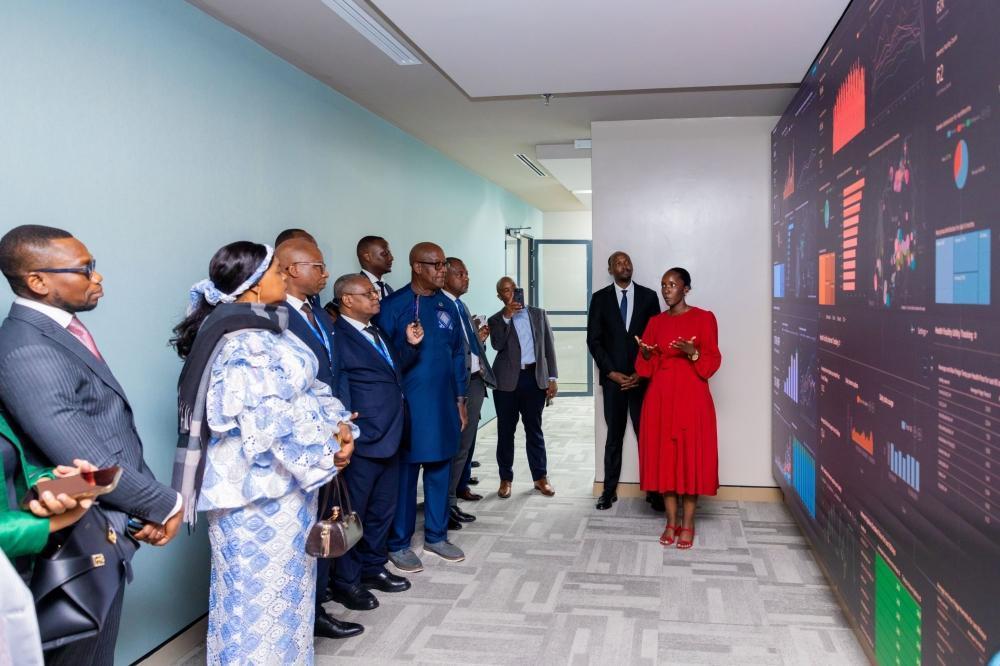Africa-Press – Rwanda. A “health intelligence centre” launched by the health ministry on Thursday, April 2, will be capable of monitoring some health services in real time, in addition to consolidating data from various facilities and communities in order to conduct analysis and inform policies.
Dubbed “Rwanda Health Intelligence Centre,” the hub employs people ranging from medical doctors, data scientists, software developers and programmers. It is located in Kiyovu in the building that houses Rwanda Utilities Regulation Authority (RURA).
The centre’s work ranges from tracking the use of public equipment like ambulances and hospital fridges, to the collection of data on medical procedure outcomes in hospitals so as to take relevant steps in terms of decision-making.
Minister of Health Dr Sabin Nsanzimana speaks at the launch of “health intelligence centre on Thursday, April 2. Photos by Kellya Keza
It comprises several departments, such as a data warehouse that stores and monitors various types of data, including patient care information, routine reports from health facilities and community health workers, and community feedback, such as social media discussions about health services and issues.
“We aim to bring all this information together for analysis to improve the functioning of health systems,” Muzungu Hirwa, a data scientist and medical doctor at the institution.
The facility also has a control room for data visualisation and analysis, a space for programmers who handle data integration, and a section dedicated to telemedicine.
Using technology, it monitors among other things, hospital leadership and assess service delivery in relation to performance contracts (Imihigo).
How equipment like ambulances, fridges will be monitored
For equipment like fridges at health facilities, the ministry has worked to install trackers and sensors which send data to the health intelligence centre to allow it to monitor whether they are functioning well and are being put to the right use.
“We can see the fridges and the exact temperature at which they are in real time. We can put the sensors on all of the equipment,” Hirwa noted.
For ambulances, using technology, the centre can know the exact location of the ambulances, the speed at which they are running and so on.
Deep analytics, use of machine learning and AI
Muhammad Semakula, the Head of Department for Planning, Monitoring, Evaluation and Health Financing at the Ministry of Health, says the data will not only be used to make decisions, but also predicting future outcomes through machine learning and artificial intelligence.
One of the centre’s key functions is to conduct in-depth analysis of health outcomes, such as identifying the causes behind specific trends and determining possible solutions.
For example, in maternal healthcare, scientists at the centre can investigate the reasons for maternal deaths, including when and under what conditions they occur, and analyse such data to draw conclusions and inform decisions.
In addition, such information can be input into machine learning models, which can predict potential future outcomes and warn medics based on patterns from past cases.
“These machine learning models can use artificial intelligence to predict situations. For example, with this technology, the system can inform the doctors that a particular woman visiting the facility is at high risk for pregnancy complications or adverse outcomes,” Hirwa explained.
The department also tracks financial data, such as hospital spending, which is important for assessing resource allocation.
The data collected and analysed by the centre will be made up of a good portion of information from Community Health Workers (CHWs), who treat large numbers of patients in local communities. The CHWs input data into a digital system on their smartphones, which is then sent to the health intelligence centre.
Semakula noted that such CHWs are a good source of healthcare data as they provide healthcare services to large numbers of people on the grassroots level.
Rwanda approximately has 58,000 workers who serve in its health systems. The data they collect during service delivery will be sent to the centre.
Dr. Sabin Nsanzimana, the Minister of Health, lauded the system, saying it will enable them to make decisions instantly as data flows in, eliminating the need for lengthy meetings and procedures.
The World Health Organisation (WHO) says regular, reliable data from health facilities and the resource systems that support them are central to ensuring availability and quality of health services.
It adds that health facility data support clinical management of patients, disease monitoring, facility management, health sector planning, and monitoring of service coverage and performance.
Rwanda and other low and middle-income countries need up to $ 4.1 billion to digitalise their healthcare systems, according to a costing study hinted at during the Mobile World Congress (MWC) that took place in Kigali in 2023.
Technology is viewed as a way of strengthening health systems, improving health financing and public health, and increasing reach for underserved populations.
Rwanda continues to move towards deeper digitisation of its health system.
For example, the country is working to implement a digital platform dubbed e-Ubuzima which aims to consolidate all healthcare services and allow patients to view their medical records online has been developed, tested and is ready to launch.
The digital application called E-Ubuzima aims to reduce time patients spend waiting to meet a doctor and get medications.
The health ministry told The New Times in January that the system will be made available to the public in three months, and will allow a patient to schedule an appointment with a doctor and medical staff to access the patient’s medical history.
Officials tour the newly unveiled health intelligence centre, launched by the health ministry on Thursday, April 2. Photos by Kellya Keza
Officials tour the newly unveiled health intelligence centre, launched by the health ministry on Thursday, April 2. Photos by Kellya Keza
Officials tour the newly unveiled health intelligence centre, launched by the health ministry on Thursday, April 2. Photos by Kellya Keza
For More News And Analysis About Rwanda Follow Africa-Press

